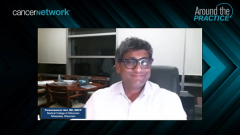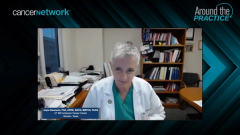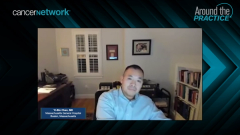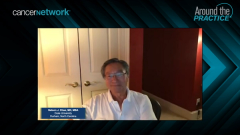
Educating Patients About Allotransplants and GVHD
Recommendations to help clinicians educate patients and caregivers about the risk of graft-vs-host disease following allogeneic transplantation.
Episodes in this series

Parameswaran Hari, MD, MRCP: GVHD [graft-vs-host disease] is something that every patient undergoing an allogeneic transplant has to think about prior to embarking on that. That’s the most important thing that preys on the mind of the patient as they’re making a decision. Joyce, what’s your experience counseling patients on what to expect, both from the acute and the chronic settings? Do patients understand it? What’s your favored approach at your center for counseling?
Joyce Neumann, PhD, APRN, AOCN, BMTCN, FAAN: We do a lot of discussion before transplant to help the patients and their caregivers understand what the risks are related to graft-vs-host disease and share with them, depending on the type of transplant and the risk factors that may be involved, in the selection of the donor. We talk with them about the likely incidence, letting them know that skin is probably the principal sign of GVHD. But they need to understand that we usually keep our patients in this area until day 80 to 100 and need to let them know that there’s no magic that happens at day 100. If they’re having active GVHD or infection or something else, they may need to stay longer, or we’ll try to manage it with community healthcare providers.
It’s (also) really important to educate the community healthcare providers. We have a survivorship program where we (have) a long-term follow-up so that we can also share with the providers when the patient does go back to their community what some of those signs and symptoms (are). They tend to be more subtle in the chronic GVHD scenario, but it’s really important to let patients know that their quality of life may change related to this, that we may be curing their disease, but many of them may end up with somewhat of a chronic condition afterward if they have chronic GVHD. Giving them a clear (and) realistic picture of all those things is important.
Parameswaran Hari, MD, MRCP: Yi-Bin, I have a question from the audience for you. Since you guys did the ATG [anti-thymocyte globulin] trial, the question is, do you routinely use ATG with matched unrelated donors as part of GVHD prophylaxis? If so, what type and dose?
Yi-Bin Chen, MD: We don’t. There are some centers across the country that do add rabbit ATG or thymoglobulin to standard tacrolimus methotrexate for unrelated transplants. There’s a good amount of literature on that, though never a convincing prospective randomized trial to substantiate it. The best data we have is from Europe, which uses a different preparation of ATG. That’s one thing to point out, that we use this term ATG, but there are different formulations and batches of ATG that are different, and that’s one of the main drawbacks to it. But the European data uses a product called ATLG [anti–T lymphocyte globulin], and they have a couple of randomized trials that lower the incidence of chronic graft-vs-host disease and don’t have a huge effect on relapse-free survival, and it’s actually approved by the EMA [European Medicines Agency] in many countries for the prevention of chronic graft-vs-host disease.
As you pointed out, we tried to do a US trial to get ATLG approved in the US for that exact indication. It was published in JCO [Journal of Clinical Oncology] in 2017. We did find that the addition of ATLG substantially lowered the incidence of chronic graft-vs-host disease, but unfortunately, it also lowered overall survival from both relapse- and non-relapse–related causes. Unfortunately, at this point, there is no approved ATG or ATLG product for chronic graft-vs-host disease in the US. Based on the trial, we certainly don’t use it conventionally.
Transcript edited for clarity.
Newsletter
Stay up to date on recent advances in the multidisciplinary approach to cancer.





































